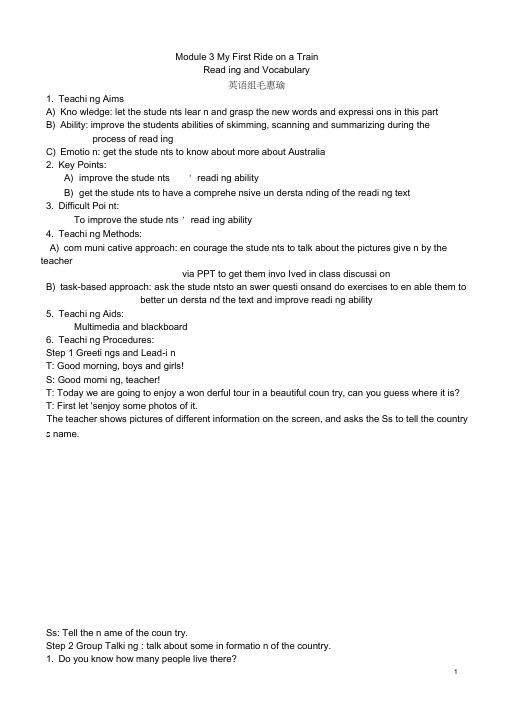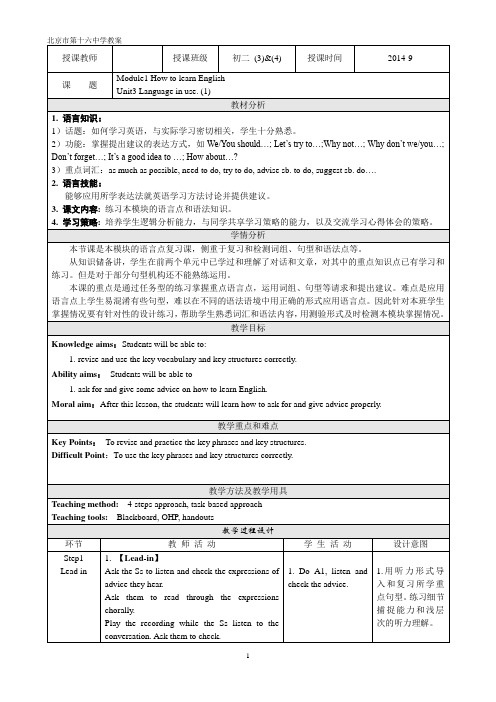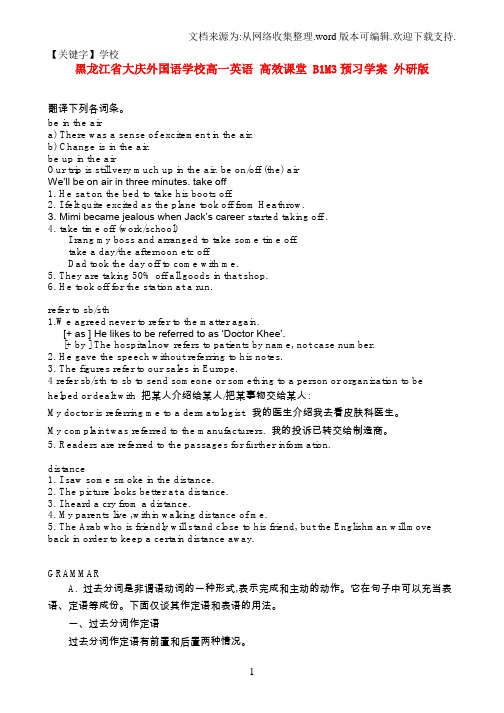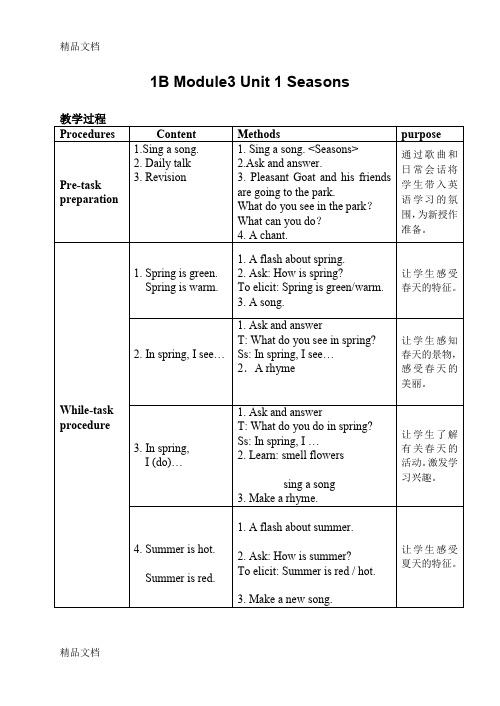B1M3-1学案
- 格式:doc
- 大小:68.50 KB
- 文档页数:2

Module 3 My First Ride on a TrainRead ing and Vocabulary英语组毛惠瑜1. Teachi ng AimsA) Kno wledge: let the stude nts lear n and grasp the new words and expressi ons in this partB) Ability: improve the students abilities of skimming, scanning and summarizing during theprocess of read ingC) Emotio n: get the stude nts to know about more about Australia2. Key Points:A) improve the stude nts ' readi ng abilityB) get the stude nts to have a comprehe nsive un dersta nding of the readi ng text3. Difficult Poi nt:To improve the stude nts ' read ing ability4. Teachi ng Methods:A) com muni cative approach: en courage the stude nts to talk about the pictures give n by the teachervia PPT to get them invo Ived in class discussi onB) task-based approach: ask the stude ntsto an swer questi onsand do exercises to en able them tobetter un dersta nd the text and improve readi ng ability5. Teachi ng Aids:Multimedia and blackboard6. Teachi ng Procedures:Step 1 Greeti ngs and Lead-i nT: Good morning, boys and girls!S: Good morni ng, teacher!T: Today we are going to enjoy a won derful tour in a beautiful coun try, can you guess where it is? T: First let 'senjoy some photos of it.The teacher shows pictures of different information on the screen, and asks the Ss to tell the country s name.Ss: Tell the n ame of the coun try.Step 2 Group Talki ng : talk about some in formatio n of the country.1. Do you know how many people live there?2. Do you know the name of the capital city?3. Where do you think most of the people live, in the central part of the country or on the coast?4. What do you think the central part of the country is like?5. What Australian animals do you know about?Step 3 Check the meaning of these words and match some of the words with these definitions.T: read the text as quickly as you can, and the n tell us what the passage is about?Step 5 Inten sive Read ingT: Now, please read the text again. This time, you should read the text carefully, underline the words, phrases and senten ces that you do not un dersta nd. And an swer the questi ons. Clear?1 I got on Sydney and got off in Alice Sprin gs.2 The Ghan train was won derful.3 We ate meals cooked by experts.4 We traveled through the desert. The sun shonand there was no wind and clouds.5 During the day, I looked out of the window andtalked with some passe ngers.6 At midni ght, the stars sho ne like diam on ds.Step 7 HomeworkRead the text again and find out some beautiful sentences.。


B3M1新学案⾼⼀英语下学期学案Module One 必修3单元知识⽬标1.熟记本模块基础知识:词汇、短语及重点句型2.掌握本模块语法:被动语态和主谓⼀致3.能够运⽤本模块所学知识表达与之相关的话题:描述⼀个城市课时安排第⼀课时:整体理解Reading & Introduction 第⼆课时:语⾔知识讲与练第三课时:Cultural Corner & Everyday English 第四课时:Grammar第五课时:45分钟课堂检测模块知识要点梳理Ⅰ. 重点词汇situated located face opposite across symbol agreementⅡ. 重点短语because of be known as ever since in terms of on the other hand little by little Ⅲ. 重点句型1.sth. be situated+介词;2. ⾮限制性定语从句。
Ⅳ. 重点语法1.被动语态的⽤法;2.主谓⼀致的⽤法。
Period One Reading (P1-3)Step 1. Warming up: Translate the following words.计划/⼯程_______ ⾯对/⾯向________ 长统靴/⽪靴______⼭脉_______ 标志性建筑_______ 象征/符号________建筑师_________ ⽂明_________ 位于_________古代的_________ 雕刻/泥塑__________ 美术馆/画廊_________ 发源地_____________ ⼤陆的/⼤洲的__________横穿/横跨_________ 坐落/位于(某处)的____________Step2. Read the passage on P2 and find the following.联合王国____________________________ 英吉利海峡___________________________ 在欧洲南部__________________________ 在法国的南边_________________________ 在西班⽛的西边______________________在欧洲东南部_________________________ 三分之⼆的国家______________________ 阿尔卑斯⼭脉_________________________ 【分析】to the west o f…(两者不接壤) in the west o f…(两者是所属关系)【练⼀练】1.台湾在中国的东部。

【关键字】学校黑龙江省大庆外国语学校高一英语高效课堂 B1M3预习学案外研版翻译下列各词条。
be in the aira) There was a sense of excitement in the air.b) Change is in the air.be up in the airOur trip is still very much up in the air. be on/off (the) airWe’ll be on air in three minutes. take off1. He sat on the bed to take his boots off.2. I felt quite excited as the plane took off from Heathrow.3. Mimi became jealous when Jack’s career started taking off .4. take time off (work/school)I rang my boss and arranged to take some time off.take a day/the afternoon etc offDad took the day off to come with me.5. They are taking 50% off all goods in that shop.6. He took off for the station at a run.refer to sb/sth1.We agreed never to refer to the matter again.[+ as ] He likes to be referred to as ‘Doctor Khee’.[+ by ] The hospital now refers to patients by name, not case number.2. He gave the speech without referring to his notes.3. The figures refer to our sales in Europe.4 refer sb/sth to sb to send someone or something to a person or organization to be helped or dealt with 把某人介绍给某人/把某事物交给某人:My doctor is referring me to a dermatologist. 我的医生介绍我去看皮肤科医生。

必修1 Unit 1 A new startSection Ⅲ Vocabulary and Using Language【学习目标】1.精准掌握P5-7单词的音、形、义、词性及部分词汇的词性转换2.理解简单句的八种基本句型,烂熟于心,会分析句子结构,并能运用英语的八种基本句型描述日常活动3.学习并运用话题词汇介绍丰富的课外活动;4.运用所学语言知识制定学习计划。
【考点分析】本板块属于“人与自我——学校生活、积极的生活态度”,包括语法部分Review: basic sentence structures、词汇部分School clubs和听说部分Making a plan。
语法部分旨在引导学生感知发现、总结规律、在真实语境中运用英语基本句型;词汇部分旨在引导学生掌握并运用有关课外活动的词汇,并谈论自己喜欢加入的俱乐部和课外活动;引导学生合理进行时间管理,制定有关学习计划。
【学习过程】(一)学习活动一:根据课本单词录音和导学案,1.精准掌握P5-7单词的音、形、义、词性及部分词汇的词性转换(突破学习目标一)任务一:听录音,读单词P5-7(from poster to schedule)并掌握以下词的词性转换和相关用法。
1.drama n.戏剧---dramatic adj.戏剧性的----dramatically adv.戏剧性地2.debate n./v.讨论用法:a debate on/over/about sth.关于某事的辩论 a heated debate一场激烈的讨论debate with sb.同某人讨论某事3.piano n.钢琴---pianist n.钢琴家4.stage n.舞台;阶段用法:on stage 在舞台上early stage 早期,初期5.photograph n.摄影---photographer n.摄影师6.argue v.争辩---argument n.争辩argue with sb.与某人争论argue about/over sth.为某事争论7.sharp adj.敏锐的---sharply adv. 猛烈地---sharpen v. (使)变得锋利---sharpener n. 磨具8.intelligent adj.有智慧的---intelligence n.智力,智商9.investigate v.调查---investigation n.调查10.v arious adj.各种各样的---vary v.变化---variety n.种类用法:vary from. . .to. . . 从·····到····转变vary in. . . 在·. ··方面不同vary with. . . 随···变化 a variety of=varieties of 各种各样的11.v olunteer n.志愿者v.自愿---voluntary adj.自愿的---voluntarily adv.自愿地用法:work/act as a volunteer 做志愿者volunteer to do sth.自愿做某事12.a pply v.申请,应用,专心于---applicant n.申请者--- application n.申请用法:apply for sth. 申请某物apply ...to...把……应用到……apply oneself to. . . 致力于···专心于...13.s chedule n.日程表用法:on schedule 按预定时间ahead of schedule 先于预定时间have a tight schedule 日程安排紧be scheduled to do sth.被安排做某事,计划做某事,定于【即时训练】完成下面的词性转换和短语互译1.drama n.戏剧----_____________ adj.戏剧性的----_____________adv.戏剧性地2.argue v.争辩---___________ n.争辩---__________3.sharp adj.敏锐的---________ adv. 猛烈地---_______ v. (使)变得锋利--______ n. 磨具4._______ adj.各种各样的---vary v.变化---_______ n.不同种类5.volunteer n.志愿者--_________ adj.自愿的---_________ adv.自愿地6.apply v.申请---____________ n.申请者--- ___________ n.申请7.一场激烈的讨论_________________________ 8.与某人争论_______________9.各种各样的___________________ 10.自愿做某事_____________________11.apply oneself to_________________ 12. be scheduled to do sth.________________(二)学习活动二:根据同步学材,理解简单句的八种基本句型,并会分析句子结构(突破学习目标二)1.任务一:句子成分:指出下列画线部分的类别及在句中所作的成分。

M o d u l e 3 —第一课时一、教学内容分析二、课堂教学过程第二课时一、教学内容分析二、课堂教学过程第三课时一、教学内容分析二、课堂教学过程第四课时一、教学内容分析二、课堂教学过程第五课时一、教学内容分析二、课堂教学过程附:模块基础知识检测题Module3MyFirstRideonaTrainI.单项选择1.WTOisshort_______theWorldTradeA.ofB.to.C.as.D.for2._________beautifulsceneryitiswheninspring!A.HowaB.WhataC.HowD.What3.Seeingthe__________thatthestudentswerebusypreparingtheirlessons,Icouldn’thelpanexpectingallof themtobeadmittedbycolleges.A.sceneryB.sightC.sceneD.view4.___________thecompanyatsuchaneveningparty,hehasbeenchoosingasuitwhichwill_____best.A.Representing;agreeB.Represented;fitC.Represent;matchD.Torepresent;suit5.Theperson______atthemeetingisfamous______anactor.A.referred;forB.referto;asC.referredto;forD.referring;as6.Theshort-wavecantravelthroughair_____light.A.ataspeedof B.atthespeedof C.inaspeedof D.inthespeedof7.Ifyouhavesometroublewithwork,Ican______youajobinthecompany.A.offerB.acceptC.supplyD.provide8.Hemadeanotherwonderfuldiscovery,_________ofgreatimportancetoscience.A.whichIthinkisB.whichIthinkitisC.whichIthinkitD.Ithinkwhichis9.Wearenotallowed_________intheclass.A.talkingB.totalkC.talkedD.read10.Inthelibrarywefoundhim________atadesk,withhisattention______onabook..A.sitting;fixingB.sit;fixedC.sitting;tobefixedD.seated;fixedII.翻译下列句子1.你认为那是什么舞蹈?2.我每天骑车去上学。
高一同步学案必修1 Module3My First Ride on a Train话题1. Describe your first ride on a train (描述你第一次乘火车旅游)2. Talking about a trip you made to a tourist spot (谈论你到一个旅游景点的观光旅行)3. Writing about one’s experie nce (写一篇自己的经历)功能Being polite (讲礼貌)须掌握的语法:1. The –ed form as the attributive (过去分词作定语)2 Past tense time expressions (一般过去时)须掌握的句型:1. Would you mind doing…?2. The fact is that ….3. What do you think of …?4. Is that right?书面表达实践:Write a diary about a visit to a place of interest (写一篇关于游览参观的日记) 第一课时词汇须掌握的单词:1. 距离 n. ____________2. 被遗弃的 adj. _____________3. 专家 n. ____________4. 产品 n. ____________5. 风景,景色 n. _____________6. 土壤 n. ____________7. 旅程 n. ____________8. 训练 vt. _______________9. 使吃惊 vt. ____________10. 面试,面谈 n. ______________11. 大事件;比赛项目 n. ____________________12. 疲惫不堪的 adj. _____________13. 仪式 n. ____________14. 半夜 n. __________15. 海滨 n. _________________单词拼写1. At Mary’s wedding c______ held the other day, I met a friend of mi ne.2. They have been married for 60 years. We are going to hold a party to celebrate their d______ wedding.3. He aimed at the wolf and s______ it.4. It is said that there is a football match between China and Japan in the s______.5. The children are taken good care of in the k________.6. Camels are much better than horses for traveling in the ______(沙漠) areas.7. From here to the station, it is a long ______ (距离)for the woman with a child in her arms.8. Alice Thompson comes from Sydney, which is an _______(澳大利亚) city.9. The students who take part in the activities can get _______(纪念品)10. He has _______(面谈) a lot of people for the job.词汇拓展:1. distance→___________(adj.)2. abandoned→ ___________(vt.)3.expert→_______(adj.) __________ (同义词)4.frighten→ ________ (adj.)→ ___________ (adj.)5. product → _____________ (n.)6. interview → _________ (vt.)____________会见者______________被接见者7. exhausted → __________(vt.)8. downtown → _____(adj.) 城镇住宅区的9. journey → _____________ (vt.) 10. train → ____________ (n.)须掌握的短语:1. know ________ 知道,了解2. get _________ 下车3. get ________ 上车4. get _________ 进入5. get ________ 避免;摆脱6. come _________ 来自;出生于7. in the __________ of 在……的中间 8. be __________ for 是…的缩写/简称9. a long ____________ ago 很久以前 10. not ___________ 不再11. out of ________ 过时 12. for _______________ time 第一次13. take _____________ (飞机)起飞 14. refer _________ 查阅,提到,谈到15. on ____________ 在途中,接近独立完成的作业: p80-p81 exercises 4-----6 (vocabulary)第二、三课时课文理解及配套练习课文理解:1. Match the main ideas of each paragraphParagraph 1. what happened to the camelsParagraph 2. the advantages of camelsParagraph 3. what I saw on the trainParagraph 4. the reason why the train is called the Ghan Paragraph 5. Introduction of my first experience on a train Paragraph 6. what I did on the train.2. Answer the questions:1 ) Where does the writer come from?A. China.B. America.C. Sydney.D. Austria.2) How was the scenery for the writer’s journey?A. Dull scenery.B. Different from area to area.C. The same as inSydney. D. Very colourful.3) Which of the following is TRUE?A. Horses were much better than camels for traveling a long distance.B. The government passed a law to protect the camels.C. The author read books and listened to English cassettes during the journey.D. They got on in Sydney and got off in Alice Springs.4) Why is the train called the Ghan?A. For many years, Australians used trained camels which were bought from Afghanistan as their main transportation.B. Ghan is short for Afghanistan.C. Camels were much better than horses for traveling in desert.D. In honor of the camels.佳句背诵:1.最近我第一次乘坐长途火车。
外研版高中英语必修一Module 1学案 (外研版英语高一)Module 1 My First Day at Senior HighPeriod I New Words and Introduction知识与技能目标:掌握amazing,method,impress 重点单词及其常见用法和短语。
重难点:掌握本模块的一些重点单词和短语。
着重掌握并灵活运用老师上课所强调的重要知识点。
学习过程:课前教师先领读本单元单词并确保每名学生会并读准单词。
一. 熟读并背诵单词表中的单词,掌握其中重点单词的基本用法。
(A级)二.完成书中第1页练习1,2并掌握学科名词.(A级)三.重点单词讲解(A级)1. amazing adj. 令人惊讶的amaze vt.使惊奇amazed adj. 吃惊的,惊讶的amazement n.惊愕,惊异①be amazed at/by... 对…大为惊奇②be am azed to do sth. 对做某事感到惊讶③be amazed that+从句因…… 而感到惊奇辨析:amazing与amazedamazing adj.令人吃惊的,多指事物,具有主动意味。
The meal is amazingly cheap. 这顿饭出奇地便宜amazed adj.吃惊的,感到惊奇的,多指人的情感,具有被动意义本单元中与amaze用法相同的动词有:bore vt.使厌烦bored adj.感到厌烦的boring adj.令人乏味的,无聊的embarrass vt.使窘迫,使人不好意思embarrassed adj.感到不好意思的,尴尬的embarrassing adj.令人难堪的disappoint vt.使失望disappointed adj.感到失望的disappointing adj.令人失望的归纳:动词加-ing形式和动词加-ed形式的形容词都可以在句中作定语和表语。
v.-ed形式通常表示主语所处的状态或感受(主要描绘人或事处于的一种状态),而v.-ing形式多表示主语所具有的特征(主要描绘人或事)。
一、根据句意及括号内所给汉语提示写出单词1. Many children think the __________ (家务) is very boring.2. It’s really __________ (愚蠢的) to make a mistake like this.3. I often have __________ (没有东西) for breakfast to go to school. It’s bad for my health.4.They will go for a __________ (野餐) on a farms this Saturday morning.5.This film is very __________ (极好的), so all of us like it very much.二、用括号内所给词的适当形式填空1.Nobody __________ (ride) a bike too the classroom every day.2.David is going __________ (do) his homework at eight this evening.3.Tony is going to have two piano __________ (lesson) this afternoon.4.Look, the two boys are __________ (watch) TV in the bedroom.5.Their __________(plan) are all about the coming holiday.三、根据句意选择括号里所给的内容补充句子1.My parents __________ my homework this evening. (checks/are going to check)2.---Are you going to go to the zoo with us?---__________. I’ll ask my parents. (I’m not sure/All right)3.---I’m going to watch the football match. Do you want to go and __________ our football team with me? (join/cheer) ---Sure.4.My uncle has __________ sons and mark is the __________ son . (second/two)5.---You are relaxing yourself here!---Yes. It feels __________to walk slowlyalong the river. (fantastic/boring)6.My teachers always ask me to__________ all of my lessons, so that I can get good grades in the tests. (look up/go over)7.There is __________ in that box. And I want to put all of my books in it. (something/nothing)8.I often help my mother do some __________ at home. I think she is too tired. (homework/housework)9.Kathy always wants to__________some new friends online. (take/make)10. I think you and your brother will enjoy __________ at the school food festival next week. (yourself/yourselves)四、根据汉语意思,完成下列句子,每空一词1. 我不知道他们这个周末的计划。
Period 1 Introduction and Reading
一、Objects:
1. To master the vocabularies about trips and try to express the vehicles.
2. To know Australia better in reading and get details better after reading.
二、Points and difficulties:
1. To learn the new words about vehicles.
2. To get the main idea of the passage and improve the ability to read.
3. To know something about Australia.
三、Preparation before class: Vocabulary
⑴Think about vehicles(交通工具)in our life: ___________________________________
________________________________________________________________________ ⑵Of all the above vehicles, _______________ can travel on roads, _______________ can travel on rails, _______________ can travel on water and _______________ can travel in the air. We can use _______________ to travel a long distance.
1. expert_____
2. camel_____
3.cassette_____
4.distance______
ernment_____
6. supply______
7. product______
8. train ______
9.recently______10.scenery _____
2. Valuable stones
3. The land, place or town by the sea
4. People who travel on a train, bus or plane
5. An area of land where it is always dry
6. A type of aircraft or a kind of airplane
7. Being given up
8. You find this on beaches 9. Where plants grow
10. White or grey things made of water in the sky
四、Procedures in class: Reading:
Task1: Predicting(预测)
What do you think the text will introduce from the title “My First Ride on a Train”?
Task2: Skimming(略读)
1. What is the passage about?
□a train ride to Sydney □taking the train to Australia
□traveling to the central part of Australia □a child visiting her grandmother
2. Try to find out the main idea of each paragraph.
Para 1: Para 2: Para 3: Para 4: Para 5: Para 6:
A: Food on the train and the scenery outside the train
B: Why is the train called Ghan?
C: What camels did in the past
D: What the author did on the train
E: How the Afghans dealt with the camels
F: A uthor’s first ride on a long- distance train
1. True or False--- if it is false, correct it.
①It was the first time that Alice had her ride on a long-distance train.
②Alice Springs is in the east of Australia.
③The train was comfortable, but the food cooked by experts was bad.
④Alice only read books and listened to Chinese cassettes during the journey.
⑤The train is called the Ghan because of camels from Afghanistan.
⑥In 1935 Australians passed a law which allowed people to shoot animals if they were a problem .
(1)From the passage, we know that Alice Thompson is from ______
A. China
B. Afghan
C. Australia
D. Austria
(2)The sentence “And what a ride!”in the first paragraph means that ______.
A. the writer enjoyed the long journey
B. the writer was made too tired from the long ride
C. that was a long and dangerous journey
D. he had nothing to see but desert
(3)The train of Ghan can run at about______ kilos per hour. A.100 B.85 C.75 D.90 (4)Before 1920s, _____________.
A. Australians couldn’t travel to the middle of the country
B. Australians didn’t dare to travel in the endless desert
C. Australians could only travel to the middle of the country by riding horses
D. camels played an important part in traveling through the desert
Task 5: Find out the following phrases in the text, then read and translate them.
①来自 ______________ ②一辆长途火车 _______________③上车__________
④下车 ______________ ⑤在…中部___________________ ⑥超过______________ ⑦在…上花时间/金钱__________________⑧专家所煮的__________________
⑨看起来像________ ⑩朝…外看__________________很久以前_______________
骑马_______________从…带来_______________是…的缩写________________
驯化了的骆驼______________带回_______________20世纪20年代_______________ 不再___________ 通过一项法律_____________ 允许某人做某事_________________ Task 6: Finish Activity 4 on Page 24.。